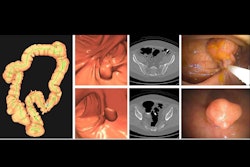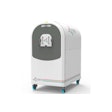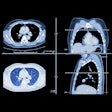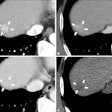A five-year interval for CT colonography (CTC) is appropriate for colorectal cancer (CRC) screening and may actually translate to earlier diagnosis of the disease compared to the two-year screening interval for fecal immunochemical tests (FITs), researchers have reported.
The study's findings add to an ongoing conversation about the use of CTC for colorectal cancer screening, and "confirm that a five-year interval for screening CTC, an imaging tool for CRC, is safe," wrote a group led by Donella Puliti, a statistician at the Institute for Cancer Research, Prevention and Clinical Network (ISPRO) in Florence, Italy. The results were published September 30 in Radiology.
Colorectal cancer (CRC) is one of the most common and lethal cancers around the world, and carries an overall five-year survival rate of 73.7%, the investigators explained. There are a number of ways to screen for it, including stool-based tests and imaging exams such as optical colonoscopy, CTC, flexible sigmoidoscopy, and capsule endoscopy, they noted. Since CTC as a screening tool for colorectal cancer shows promise in many ways compared to fecal testing or other modes of imaging, Puliti and colleagues sought to evaluate whether the five-year interval for screening CTC is appropriate and whether CTC is associated with earlier diagnosis compared to biennial FIT screening.
The group conducted a secondary analysis of data from the SAVE trial that consisted of information from March 2012 to March 2018 and included 14,981 participants between the ages of 54 and 65 years. Patients were randomly assigned to groups that either underwent a single CTC exam or three biennial FITs for colorectal cancer screening over the study time period. After the SAVE trial ended, all participants younger than 70 years were invited to undergo biennial FIT. For this analysis, Puliti's team compared incidence rates of colorectal cancer and advanced adenoma among 1,286 participants who underwent CTC and 6,027 participants who underwent at least one trial FIT during an eight-year follow-up period, adjusting the results for age, sex, and socioeconomic status.
The authors reported the following:
- In the CT colonography arm, one interval colorectal cancer was observed during the five years following CTC imaging; no cancers were subsequently detected.
- Overall, nine colorectal cancer cases were diagnosed in the CT colonography arm and 58 in the fecal immunochemical testing arm, with no significant difference in CRC incidence rates between the two groups (adjusted hazard ratio, 0.73; p = 0.38).
- By the end of the follow-up period, the CT colonography arm showed a "persistently and significantly higher incidence rate" of advanced adenoma compared with the FIT arm (adjusted hazard ratio, 1.46; p = 0.007).
The takeaway? CTC is the "more fit" colorectal cancer screening test, wrote Jason Pietryga, MD, of Mayo Clinic Florida in Jacksonville and colleague David Kim, MD, of the University of Wisconsin in Madison, in an accompanying editorial. The two noted that the study findings "are in line with previously reported data supporting the safety of the five-year [CTC] interval."
"As radiologists, we need to ensure that we can provide the availability and expertise needed to make CT colonography a primary screening tool for CRC," Pietryga and Kim concluded.
The complete study can be found here.





















